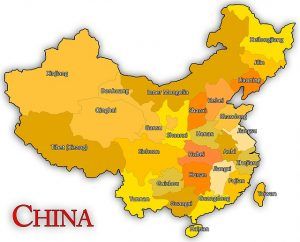Doing Business in China and Working With the Chinese
[4-min read]
Question: How to do business with the Chinese?
Answer:
- Respect the hierarchy and don’t jump “rank” (skipping a layer of hierarchy)
- Loss of face is real. Be careful to single out an individual when working in groups or teams
- Understand the Indian-head-nod
- A “yes” is not always a “yes,” so don’t push it. Ask circumventing questions to get the real answer
- Family is important, just like relationships. Take your time to develop them. It’ll be worth your while
- Not every Indian speaks English, nor do they all work in IT
- Read this article…
In this country-specific article, I will cover several topics:
- Doing business in China, or the Culture of China
- Business Culture in China
- Understanding Chinese Culture
- Working with the Chinese
What This Article is NOT About
Although I will use some statistics here and there and sum up some numbers, this article is not about the facts and figures. It’s about understanding the culture of China. More statistics about doing business in China can be found here.
And although there is a map of the country on the right, this article is not a tourist guide. It’s about business culture in China and working with the Chinese. Another good source for a better understanding of Chinese culture is Wikipedia. Click here to find out more.
A news site on China can be found here. If you want to know how to do business in China, this article will help you in the right direction.
Then, Why This Article?
Question: Is doing business in China easy or difficult?
Everyone who has ever been in China, be it in big cities or more rural areas, must have found cultural differences between their own culture and the culture of China.
As I say in my podcasts every time, I’m not in the convincing business. I’m here to offer a plan. A plan for people who are looking for solutions. And when you’re doing business in China, you need a plan. Not only a sales and marketing plan. It would be best if you also had a cultural plan.
And the more you understand Chinese culture, the better, more efficient, and more effective you will be.
So, this article is about you. You who do business in China.
How to do Business in China?
Recognize this?
- You don’t understand their English.
- The subtle nonverbal cues are hard to understand
- You get what you ask for, but not what you want.
- You wonder why the Chinese don’t ask for help if they don’t understand something.
- Why are the Chinese sometimes very polite and timid, and on the other hand, they can be really rude?
- Why do the Chinese never give you a “straight” answer?
- Etc.
If you recognize any of the above examples, read on…
What is the Business Culture of China?
On the right-hand side, you see a table with an overview of how China scores on the first four primary dimensions of culture.
As you can see, China, compared to the other Western countries, scores quite differently (any score with more than a 10-point difference is significant). But not on all dimensions. This means that when you’re working with Chinese, it is important to realize that different cultures will have different ways of doing business in China.
How to do business in China is not something that is fixed in concrete. Nor is it something that you can write down on one piece of paper, an article, or a book, not even in many books.
What is important is that you, a non-Chinese, realize that your culture is different (not better!) than the Chinese culture. And if you want to succeed in doing business in China, you’d better not only take the rules, regulations, and language into account. You’d better also understand the culture of China. If you miss that, your business will not work (or will take a lot more time, costing you a lot of money).
Working With Chinese. A Practical Guide
As said before, working with the Chinese will be different for different cultures.
In 2015, I was in Beijing some time back for work. After my first day of work was over, I had some time to myself to explore the city. Having some local money, a credit card, and a can of Coke, I decided to go for a walk. Before I took off, I had a vague idea of where I would be going, but got lost after walking about four blocks. Fortunately for me, I had plenty of time and eventually made it back to my hotel alright, but I’ve never felt so alone in such a big city. You can’t read any signs (other than in the metro), and hardly anyone speaks English.
- Chinese people will generally not say no if you ask them to do something. That is, if you are the boss, or are perceived as the boss.
- In the US and UK, it is possible to delegate upward. Meaning that if your boss asks you to do something, you can make it conditional to the extent that you can request your boss to do this or that for you to do what your boss asks you to do. This does not happen in China. You can even say that upward delegation in China is simply not done.
- Being more collectivistic or Loyalty to Group-oriented (a lot more than, for instance, Indians), the Chinese put a lot more emphasis on relationships than on tasks. For a Chinese, it is important to know who you are as a person. Relationships over tasks is important in China. In the West, it is task over relationships. Although contracts are important in China, who you are is much more important. To that extent, the contract is secondary.
“I’ve never felt alone in such a big city.”
- Chinese communicate indirectly. Direct questions from Westerners are seen as rude and impolite. Whereas in the West we can really only deal with direct answers in the form of Yes and No, the Chinese, in the eyes of Westerners, seem to avoid giving a “straight” answer. In their eyes, they give you a straight but polite answer. It’s just that the West can’t “read” that kind of indirectness.
- Being a Manager gives status.
- Although at first, you might not see this, rules and regulations are not as important in China as they are in the West. Even though you may experience China as very bureaucratic, the rules, regulations, paperwork, etc., are mainly a fiction of the power of the powerholder. Not so much a display of the necessity of rules.
Summing it Up
Doing business in China, understanding the culture of China, and working with the Chinese are not as straightforward as you might think. And that says absolutely nothing about the Chinese themselves. It says everything about the cultural differences between China and Western cultures.
Not many Chinese speak English. It is changing, but in a country as big and diverse as China, this will take a while.
How to do business in China is not easy. In a recent survey, I held myself, international managers ranked China as the second most difficult country to do business with. The culture of China is so different from Western culture that you must understand it better to succeed there.
Remember, Culture eats strategy for breakfast
Related keywords: Guide to doing business in China, doing business in China cultural differences, cultural challenges of doing business in China
Should you want to read an article on cultural similarities that can lead to cultural difficulties, read this case study.
Read more on how China (and the rest of the world) dealt with the Corona crisis here.
Another article about China and the Chinese can be found here.
President George Bush in China. Read the article here.
A podcast with Lawrence Draken on China can be found here.
An article about China and Tibet can be found here.
Another podcast on China can be found here.
Want to read more: https://culturematters.com/product-sourcing-in-china-with-omer-sasson/
Want to read more: https://culturematters.com/192-cultural-differences-and-franchising-with-adam-goldman/
Want to know more: https://culturematters.com/chinese-american-culture-with-ken-wilcox/
Want to know more: https://culturematters.com/cultural-muscle-flexing-bush-in-beijing-political-rhetoric/
An Overview of China, the Country

15 Things You Didn’t Know About the Culture of China
Scores of China on the First Four Primary Dimensions of Culture
| Hierarchy | Loyalty | Goal Orientation | Predictability | |
| China | 80 | 28 | 68 | 25 |
| United States | 39 | 90 | 63 | 45 |
| France | 65 | 75 | 49 | 88 |
| United Kingdom | 38 | 90 | 65 | 36 |
Above are the scores of China compared to some other Western European countries. If you want to know more specifics about each of these dimensions, click here.
The Five Biggest Challenges to Doing Business in China

Deliberately I got lost in Bejing. I had a map, but couldn’t read the street names anyways. But before I took off, I bought this can of coke.

Here you see me standing at, yes, the Great Wall of China. Very impressive. Although of the 3500 kilometers only a bit is actually good enough to visit.
An interesting detail is that the part where this picture is taken is maintained by a… German company.
Get a Taste of How Chris Presents, Watch his TEDx Talk
 Call Direct: +32476524957
Call Direct: +32476524957
 European Office (Paris) Whatsapp: +32476524957
European Office (Paris) Whatsapp: +32476524957
The Americas (USA; Atlanta, GA; también en Español): +1 678 301 8369
Book Chris Smit as a Speaker
If you're looking for an Engaging, Exciting, and Interactive speaker on the subject of Intercultural Management & Awareness you came to the right place.
Chris has spoken at hundreds of events and to thousands of people on the subject of Cultural Diversity & Cultural Competence.
This is What Others Say About Chris:
- “Very Interactive and Engaging”
- “In little time he knew how to get the audience inspired and connected to his story”
- “His ability to make large groups of participants quickly and adequately aware of the huge impact of cultural differences is excellent”
- “Chris is a dedicated and inspirational professional”
In addition, his presentations can cover specific topics cultural topics, or generally on Cultural differences.
Presentations can vary anywhere from 20 minutes to 2 hours and are given worldwide.
Book Chris now by simply sending an email. Click here to do so.
Read more about what Chris can do for you.
- Percentage of People Rating a Presentation as Excellent 86%
- Rating the Presentation as Practical 89%
- Applicability of Chris' presentation 90%
About Peter van der Lende

Peter has joined forces with Culture Matters.
Because he has years and years of international business development experience joining forces therefore only seemed logical.
Being born and raised in the Netherlands, he has lived in more than 9 countries of which most were in Latin America.
He currently lives in Atlanta, Georgia (USA) with his family.
You can find out more at https://expand360.com/
Or find out what Peter can do for you here.
- Sport and Cultural Identity - 17 February 2026
- Performance Reviews and Appraisal System - 20 January 2026
- 199 AI, Leadership, and Cultural Differences with Crispin Thompson - 13 January 2026

 Call Direct: +32476524957
Call Direct: +32476524957 European Office (Paris) Whatsapp: +32476524957
European Office (Paris) Whatsapp: +32476524957